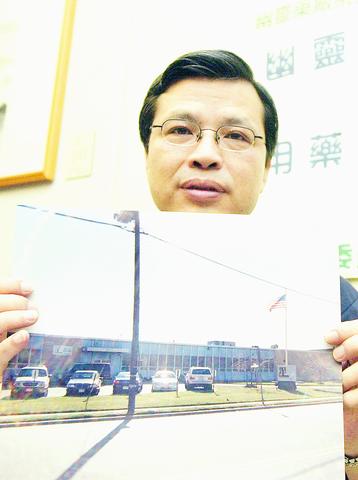As Taiwan prepares to enter the WTO, stricter regulations on imported medications are needed to prevent disqualified pharmaceutical manufacturers from selling drugs even after their operations overseas are closed down, a DPP lawmaker said yesterday.
Due to a lack of clear regulations regarding the extension of drug certificates, drugs with false certificates can often be found in the market. This situation will deteriorate when Taiwan is admitted to the WTO and more drugs come onto the market, according to DPP Legislator Chang Ching-fang (張清芳).

PHOTO: GEORGE TSORNG, TAIPEI TIMES
By law, certificates are required for any drugs that are imported into Taiwan, Chang said, and to protect consumers, tight regulations are applied on issuing certificates for new medicines. But in contrast, he said, extensions for expiring certificates are not scrutinized closely enough.
The lack of an effective evaluation process has cast doubt on at least 60 drug certificates among more than 10,000 on the market, and it is also common knowledge that one certificate is often used for many different kinds of medicine. In addition, certificates and drugs are sometimes found to be mismatched, the lawmaker said.
While Chang commended the Department of Health for enforcing stricter controls on issuing certificates for new medicine, the lawmaker lashed out at the bureau's assessment procedures regarding the extension of old ones.
Under current practice, foreign pharmaceutical producers intending to renew their existing certificates need only present approval from two places -- one from the health department of the country of the manufacturer, the other from that country's Taiwanese embassy or representative office.
Certificates will be renewed as long as the written documents are submitted, and investigations are not carried out to verify the credibility of these papers, or the quality of these manufacturers' goods.
The lawmaker gave one example to reveal the severity of the issue. He said that Ford Laboratory, a pharmaceutical factory located in New Jersey, no longer exists, but is still selling drugs in Taiwan with valid certificates.
According to information provided by the Board of Foreign Trade's office, stationed in the US, Ford Laboratory was forced to shut down in 1995 due to tax evasion. But according to records of the Department of Health, the manufacturer still has 10 valid certificates in Taiwan, and eight of them were approved for extension between 1998 and 1999, Chang said.
Chien-min (
Responding to the lawmaker's censure, Hu Yoa-pu (
"If [the agent] fails to provide a reasonable account within a month, we will order the questionable products be taken off the shelf," the official said. "But it is still within the one-month grace period, therefore the selling of Ford Laboratory products is still legal."

US President Donald Trump yesterday announced sweeping "reciprocal tariffs" on US trading partners, including a 32 percent tax on goods from Taiwan that is set to take effect on Wednesday. At a Rose Garden event, Trump declared a 10 percent baseline tax on imports from all countries, with the White House saying it would take effect on Saturday. Countries with larger trade surpluses with the US would face higher duties beginning on Wednesday, including Taiwan (32 percent), China (34 percent), Japan (24 percent), South Korea (25 percent), Vietnam (46 percent) and Thailand (36 percent). Canada and Mexico, the two largest US trading

AIR SUPPORT: The Ministry of National Defense thanked the US for the delivery, adding that it was an indicator of the White House’s commitment to the Taiwan Relations Act Deputy Minister of National Defense Po Horng-huei (柏鴻輝) and Representative to the US Alexander Yui on Friday attended a delivery ceremony for the first of Taiwan’s long-awaited 66 F-16C/D Block 70 jets at a Lockheed Martin Corp factory in Greenville, South Carolina. “We are so proud to be the global home of the F-16 and to support Taiwan’s air defense capabilities,” US Representative William Timmons wrote on X, alongside a photograph of Taiwanese and US officials at the event. The F-16C/D Block 70 jets Taiwan ordered have the same capabilities as aircraft that had been upgraded to F-16Vs. The batch of Lockheed Martin

China's military today said it began joint army, navy and rocket force exercises around Taiwan to "serve as a stern warning and powerful deterrent against Taiwanese independence," calling President William Lai (賴清德) a "parasite." The exercises come after Lai called Beijing a "foreign hostile force" last month. More than 10 Chinese military ships approached close to Taiwan's 24 nautical mile (44.4km) contiguous zone this morning and Taiwan sent its own warships to respond, two senior Taiwanese officials said. Taiwan has not yet detected any live fire by the Chinese military so far, one of the officials said. The drills took place after US Secretary

THUGGISH BEHAVIOR: Encouraging people to report independence supporters is another intimidation tactic that threatens cross-strait peace, the state department said China setting up an online system for reporting “Taiwanese independence” advocates is an “irresponsible and reprehensible” act, a US government spokesperson said on Friday. “China’s call for private individuals to report on alleged ‘persecution or suppression’ by supposed ‘Taiwan independence henchmen and accomplices’ is irresponsible and reprehensible,” an unnamed US Department of State spokesperson told the Central News Agency in an e-mail. The move is part of Beijing’s “intimidation campaign” against Taiwan and its supporters, and is “threatening free speech around the world, destabilizing the Indo-Pacific region, and deliberately eroding the cross-strait status quo,” the spokesperson said. The Chinese Communist Party’s “threats